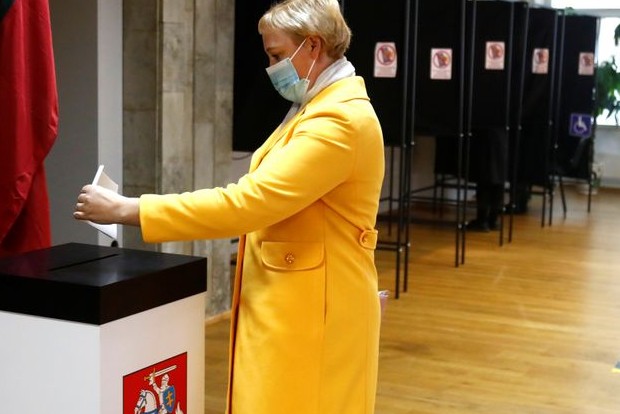
(Reuters) – Lithuania’s main opposition party, the centre-right Homeland Union, appeared likely to win Sunday’s first round of a national election, in what is seen as a backlash to Prime Minister Saulius Skvernelis’ handling of the coronavirus crisis.
With about 85% of votes counted, the party, which has roots in the 1980s anti-Soviet independence movement, was in the lead with 23.2%.
The Farmers and Greens party (LVZS), an agrarian grouping that leads Skvernelis’ ruling coalition, was at 18.3%.
More ballots are due to come in from larger cities, the Homeland Union’s main electoral base where LVZS is unpopular.
“It is very likely that the party will be the number one”, Homeland Union chairman Gabrielius Landsbergis told Reuters in his party headquarters in central Vilnius.
Ramunas Karbauskis, LVZS’ leader, appeared ready to concede. “It seems that, after all the votes are counted, we will be number two”, he said.
With the spectre of an extended pandemic ahead, all main parties were careful about outlining their fiscal policy during the election campaign, even though persistent economic inequality is a major voter concern.
More than a dozen other groups are also in the running, opening the way for complicated coalition talks that will affect the shape of economic policy following the ballot.
Under Lithuania’s hybrid election system, half of the 141-member parliament will be elected on Sunday in a proportional vote. The remaining lawmakers are elected in constituencies, with a run-off vote for the top two candidates in each of them scheduled on Oct. 25.
Mindful of contagion, election officials asked voters to mark ballots with their own pens. Lithuania has reported 8,899 coronavirus infections – including a record 205 new cases on Saturday – and 103 deaths.
Many in the Baltic Sea state of less than 3 million are aggrieved at income inequality despite brisk economic growth since Lithuania joined the European Union in 2004.
A fifth of people were at risk of poverty in 2019, mostly the elderly, which was the same figure as a decade ago, according to the state statistics authority.
However, Lithuania’s relative resistance to the economic impact of coronavirus curbs has helped offset a previous slump in support for the government over corruption allegations.
The economy decreased 4% year-on-year in the second quarter of 2020, the second best result in the EU. The central bank attributed that to a prompt and short lockdown, generous state support and relatively unaffected trading partners.






